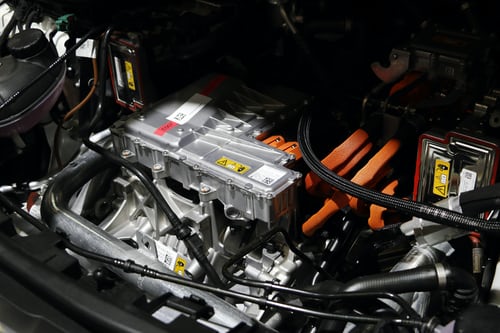The $2-billion deal to kick-start electric vehicle production at Ford Canada plants is long overdue. Save for a brief run of electric RAV4s at Toyota Canada’s plant, it will be Canada’s first major foray into large scale EV production and component supply. And it is vital for Canada to do so and to do more.
To date, the supply of electric cars in Canada has been limited. Limited because the US ZEV Mandate ensures that most production goes to participating states. Limited because battery supply is inadequate and supply chains are underdeveloped. In order to meet the demand for EVs in Canada, we need domestic production.
Make no mistake, despite some experts who tell the public otherwise, the demand for electrified vehicles outstrips supply in Canada. In BC, for example, government data for 2019 shows that the number of registered electric cars doubled from the previous year. As intensifying public pressure from the effects of the climate crisis mount, the deadline for ending ICE (internal combustion engine) sales will also come closer in time. BC is already under pressure to move the deadline from 2040 to 2030. Province after province will follow BC’s lead in prohibiting the sales of ICE vehicles. Over 25% of carbon emissions are attributable to road transportation, half being “light duty” or cars.
The opportunities are huge, and Canada has the engineering expertise to do the job. Existing Canadian based companies are ready to grow and fill the need. We can bolster Canadian mining operations for raw materials used in ZEVs (Zero Emission Vehicles), and we can retrain fossil fuel industry workers to work in a more secure and growth-oriented sector. If we were ever to invest in high tech, job creating, future oriented manufacturing, this is a sector that has tremendous potential, social and environmental benefits and advantages to the consumer. The total costs of EV ownership are much less, and the longevity of the vehicles much greater. The shift to EVs leverages Canada’s plentiful and growing supply of clean renewable electric power.
Beyond fulfilling the demand for electric cars in Canada, there is an even larger market to be tapped. Few inroads have been made in the medium and heavy-duty vehicle market. Commercial fleets currently have few options for electrifying and very few made in Canada options. In the world of electric buses Canada has made significant inroads. Electric buses currently operating in Winnipeg, even in the cold of Manitoba winters, were built in Canada by Winnipeg’s New Flyer Industries. Quebec’s Nova bus also has electric units operating at both ends of the country. Lion Electric of Quebec is launching a line of buses and heavy-duty trucks. In British Columbia GreenPower Motor Company, EVT Motors and Canadian Electric Vehicles all have offerings in the heavy-duty vehicle market. Beyond cars, trucks and buses ships, trains and planes will all benefit from the electric revolution.
For large vehicle mobile energy where battery electric power alone is insufficient, hydrogen fuel cell range extension can fill the gap. Hydrogen fuel cells combined with batteries can make electric drive fleet vehicles interoperable with legacy diesel. That interoperability is what is required for fleets to be able to methodically convert to zero emission vehicles in the heavy duty sector. In hydrogen fuel cells, Canada is already an established leader, ready to seize the global opportunity.
EV production has the potential to be the largest manufacturing sector in Canada with multiplier effects for mining and a supporting supply chain. It will increase our trade surplus, enable the transition away from increasingly expensive fossil fuels, provide employment and contribute to economic resilience. Could the day be far off before an all Canadian line of vehicles dominates domestically and internationally? Might we suggest a name? The Canadian Arrow.
Arden Henley, Ed.D.
Board Chair
Green Technology Education Centre
https://gteccanada.ca
John Stonier. CA, CPA
CEO
Signature Renewables
https://www.signaturerenewables.com/
Read articles on climate change, sustainability, education, and more from GTEC’s Communication & Media (formally GTEC Blog)!

